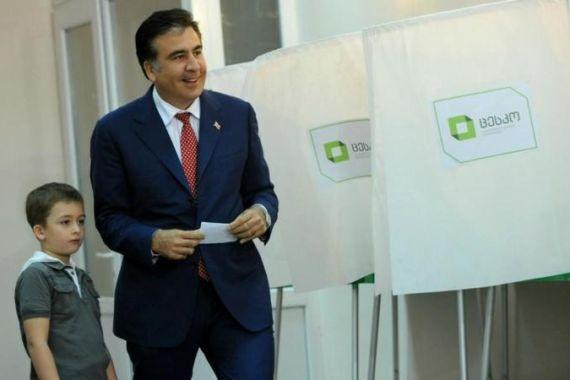Profile: Mikhail Saakashvili
The pro-Western president of Georgia has been in power for almost ten years.

Mikhail Saakashvili, the Georgian president, came to power in a landslide victory in 2003, and quickly moved to set Georgia on a course towards the West and away from Russian influence.
He introduced free-market economic policies and announced Georgia’s ambition to join NATO.
Saakashvili’s attempt to reassert Georgia’s control over the breakaway territories of Abkhazia and South Ossetia, which looked to Moscow for leadership, lead to a short war with Russia in 2008, which Georgia lost.
Saakashvili was born in Tbilisi, the capital of what was then the Georgian Soviet Socialist Republic in the Soviet Union, in 1967.
He studied law in Ukraine, New York, Washington and France and became fluent in English, French, Russian and Ukranian.
He married Sandra E Roelofs, who is of Dutch origin, in Manhattan in 1993 and has two sons, Eduard and Nikoloz.
Return to Georgia
Saakashvili had always intended to return to Georgia, and in October 2000 was appointed justice minister by Eduard Shevardnadze, the country’s then president.
 |
| Saakashvili had initially viewed Shevardnadze as his mentor [EPA] |
But by 2001, the man who saw Shevardnadze as a mentor had quit his ministerial job in protest against government corruption and the veteran leader’s inability to combat it.
“I consider it immoral for myself to remain as a member of Shevardnadze’s government,” he said at the time.
Later that year, he formed what is now Georgia’s main opposition party, the United National Movement (UNM).
In 2003, Saakashvili was elected to replace Shevardnadze, who stepped down following the bloodless Rose Revolution.
After his election as president, Saakashvili moved to take greater control of Georgia’s breakaway regions.
He accused Russia of interfering in Georgian affairs and relations between the two countries declined rapidly following rows over the price of gas, which Georgia imports from Russia.
In 2006 Russia, imposed a blockade on Georgian exports and expelled a number of Georgians living in Russia.
Violent suppression
In 2007, Georgia faced its worst crisis since the Rose Revolution.
Irakli Okruashvili, a former member of Saakashvili’s government, accused the president and his allies of murder and corruption.
The allegations led to a series of anti-government demonstration which came to a head in November 2007.
The protests were lead by several opposition groups and Badri Patarkatsishvili, an influential media owner.
Saakashvili’s decision to use police force against the demonstrators led to violence on the streets of Tbilisi on November 7.
The declaration of a state of emergency that month and restrictions imposed on much of the media led to domestic and international criticism Saakashvili’s government.
Following the condemnation, Saakashvili made a number concessions to the opposition and announced he would hold early presidential elections for January 5, 2008.
He was re-elected as president with a majority of votes, but many people inside and outside the country questioned the fairness of the poll.
Russian conflict
In April 2008, NATO’s announcement that Georgia would be allowed to join the military alliance at some point angered Russia, which opposed the eastward expansion of the organisation.
 |
| Russia immediately responded with a devastating counter-attack [GALLO/GETTY] |
Weeks later, tensions between the countries rose further as Russia said it was establishing formal ties with South Ossetia and Abkhazia.
In July 2008, Russia admitted its fighter jets had entered Georgian airspace over South Ossetia and in August Saakashvili ordered Georgian troops to retake the breakaway region.
Russia immediately responded with a devastating counter-attack, ejecting Georgian troops from both South Ossetia and Abkhazia.
The following month, Dmitry Medvedev, the Russian president, signed treaties with South Ossetia and Abkhazia, committing Moscow to defend the Georgian breakaway regions from “outside attack”.
In November 2008, thousands of opponents of Saakashvili held a rally in Tbilisi to demand early elections.
Armed mutiny
In April 2009, more demonstrations took place, with tens of thousands of opposition supporters launching protests in the Georgian capital calling for the president to step down.
Saakashvili made clear he would not resign and accused Russia of financing the rallies.
On April 16, Russia demanded NATO call off military exercises due to be held in Georgia in May, saying they would “complicate” tensions in the region.
On May 5, soldiers from a tank battalion in the Gori region staged a mutiny which Georgia’s interior ministry said had been “directed” from Russia and aimed at disrupting the Nato exercises.
Moscow’s envoy to NATO denied any involvement.
Parliamentary vote
Now 44 years old, Saakashvili is facing one of the biggest tests of his power in parliamentary elections on October 1. Billionaire Bidzina Ivanishvili, the richest man in the country, hopes to lead his Georgian Dream movement to victory.
The vote comes in the wake of a prison abuse scandal that prompted mass protests. Video footage aired by two opposition television stations showed prison guards beating and sodomising an inmate. Saakashvili’s government says the video was recorded by guards bribed by people with political motives, according to Reuters.
After voting at a polling station in Tbilisi, Saakashvili said, “It is a day of historic importance for Georgia. The fate of the Georgian state is being decided,” reported AFP. A poll conducted by the US National Democratic Institute in August found 37 per cent supported Saakashvili’s United National Movement against just 12 per cent for Georgian Dream. However, the poll was taken before the prison abuse scandal, and a large portion of Georgians remain undecided.
Saakashvili will be ineligible to run for a third term in office when presidential elections are next held in 2013.